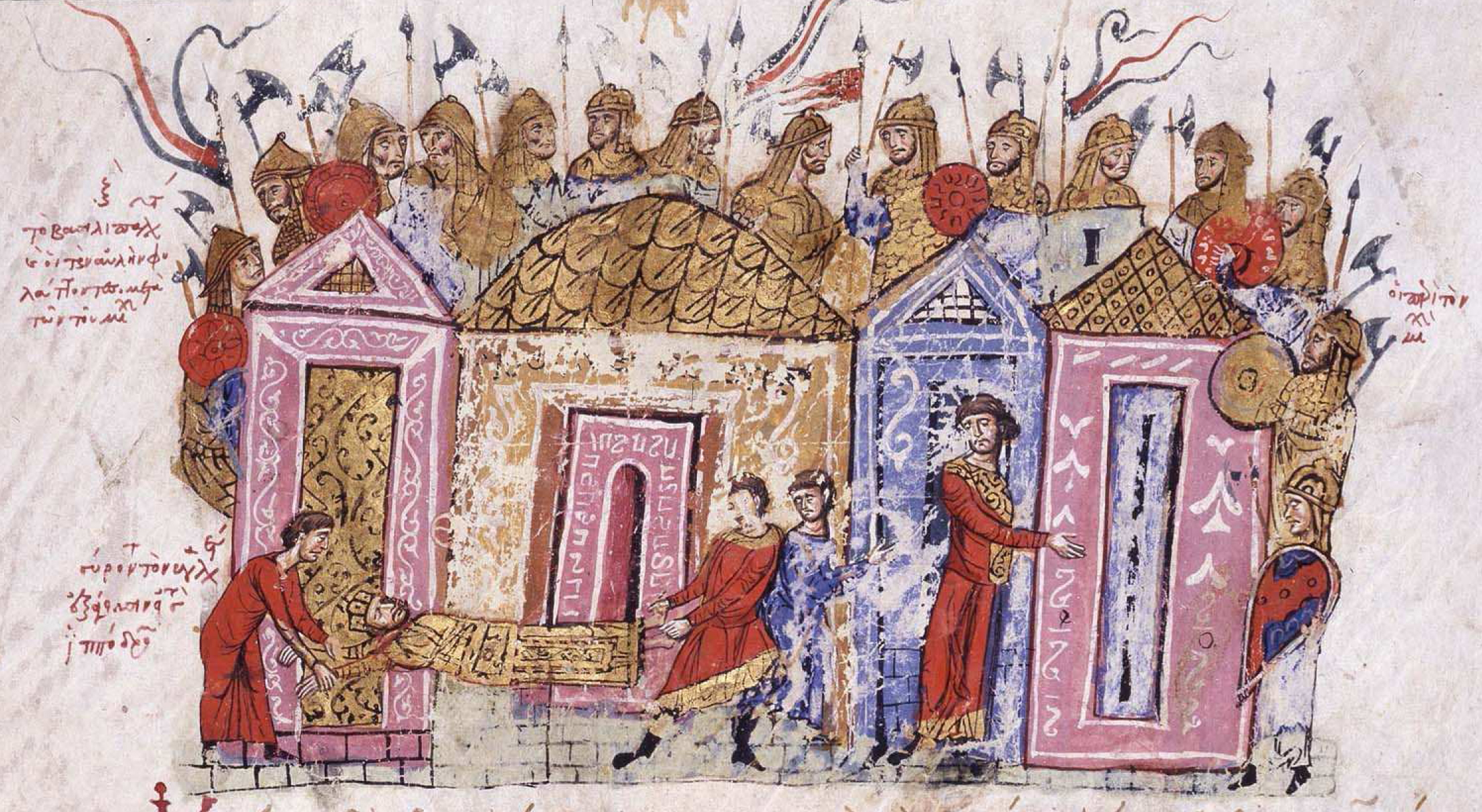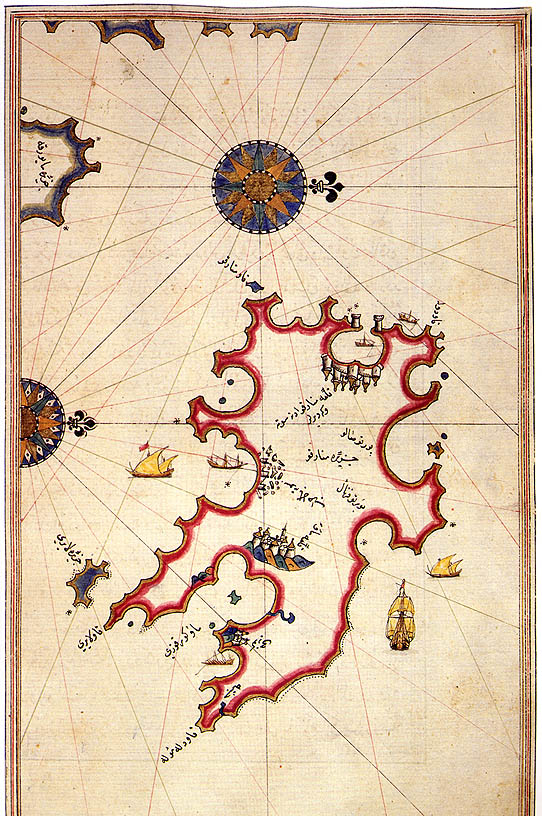|
New England (medieval)
New England ( la, Nova Anglia, ang, Nīwe Englaland) was a colony allegedly founded, either in the 1070s or the 1090s, by English refugees fleeing William the Conqueror. Its existence is attested in two much later sources, the French ''Chronicon Universale Anonymi Laudunensis'' (which ends in 1219) and the 14th-century Icelandic '' Játvarðar Saga''. They tell the story of a journey from England through the Mediterranean Sea that led to Constantinople, where the English refugees fought off a siege by heathens and were rewarded by the Byzantine Emperor Alexius I Comnenus. A group of them were given land to the north-east of the Black Sea, reconquering it and renaming their territory "New England". Sources There are two extant sources which give an account of the foundation of "New England". The first account is the ''Chronicon Universale Anonymi Laudunensis''. This was written by an English monk at the Premonstratensian monastery in Laon, Picardy, and covers the history of the wor ... [...More Info...] [...Related Items...] OR: [Wikipedia] [Google] [Baidu] |
William The Conqueror
William I; ang, WillelmI (Bates ''William the Conqueror'' p. 33– 9 September 1087), usually known as William the Conqueror and sometimes William the Bastard, was the first House of Normandy, Norman List of English monarchs#House of Normandy, king of England, reigning from 1066 until his death in 1087. A descendant of Rollo, he was Duke of Normandy from 1035 onward. By 1060, following a long struggle to establish his throne, his hold on Normandy was secure. In 1066, following the death of Edward the Confessor, William invaded England, leading an army of Normans to victory over the Anglo-Saxons, Anglo-Saxon forces of Harold Godwinson at the Battle of Hastings, and suppressed subsequent English revolts in what has become known as the Norman Conquest. The rest of his life was marked by struggles to consolidate his hold over England and his continental lands, and by difficulties with his eldest son, Robert Curthose. William was the son of the unmarried Duke Robert I of Normandy ... [...More Info...] [...Related Items...] OR: [Wikipedia] [Google] [Baidu] |
Sveinn Ástríðarson
Sweyn Estridsson Ulfsson ( on, Sveinn Ástríðarson, da, Svend Estridsen; – 28 April 1076) was King of Denmark (being Sweyn II) from 1047 until his death in 1076. He was the son of Ulf Thorgilsson and Estrid Svendsdatter, and the grandson of Sweyn Forkbeard through his mother's line. He was married three times, and fathered 20 children or more out of wedlock, including the five future kings Harald Hen, Canute the Saint, Oluf Hunger, Eric Evergood, and Niels. He was courageous in battle, but did not have much success as a military commander. His skeleton reveals that he was a tall, powerfully built man who walked with a limp. Biography Accession to the throne Sweyn was born in England, Bricka, Carl Frederik, ''Dansk Biografisk Lexikon'', vol. XVII vend Tveskjæg – Tøxen 1903pp.3–5 as the son of Ulf Thorgilsson and Estrid Svendsdatter, the latter of whom was the daughter of King Sweyn I Forkbeard and sister of Kings Harald II and Canute the Great. Sweyn grew up a m ... [...More Info...] [...Related Items...] OR: [Wikipedia] [Google] [Baidu] |
Piracy
Piracy is an act of robbery or criminal violence by ship or boat-borne attackers upon another ship or a coastal area, typically with the goal of stealing cargo and other valuable goods. Those who conduct acts of piracy are called pirates, vessels used for piracy are pirate ships. The earliest documented instances of piracy were in the 14th century BC, when the Sea Peoples, a group of ocean raiders, attacked the ships of the Aegean and Mediterranean civilisations. Narrow channels which funnel shipping into predictable routes have long created opportunities for piracy, as well as for privateering and commerce raiding. Historic examples include the waters of Gibraltar, the Strait of Malacca, Madagascar, the Gulf of Aden, and the English Channel, whose geographic structures facilitated pirate attacks. The term ''piracy'' generally refers to maritime piracy, although the term has been generalized to refer to acts committed on land, in the air, on computer networks, and (in scie ... [...More Info...] [...Related Items...] OR: [Wikipedia] [Google] [Baidu] |
Sardinia
Sardinia ( ; it, Sardegna, label=Italian, Corsican and Tabarchino ; sc, Sardigna , sdc, Sardhigna; french: Sardaigne; sdn, Saldigna; ca, Sardenya, label=Algherese and Catalan) is the second-largest island in the Mediterranean Sea, after Sicily, and one of the 20 regions of Italy. It is located west of the Italian Peninsula, north of Tunisia and immediately south of the French island of Corsica. It is one of the five Italian regions with some degree of domestic autonomy being granted by a special statute. Its official name, Autonomous Region of Sardinia, is bilingual in Italian and Sardinian: / . It is divided into four provinces and a metropolitan city. The capital of the region of Sardinia — and its largest city — is Cagliari. Sardinia's indigenous language and Algherese Catalan are referred to by both the regional and national law as two of Italy's twelve officially recognized linguistic minorities, albeit gravely endangered, while the regional law provides ... [...More Info...] [...Related Items...] OR: [Wikipedia] [Google] [Baidu] |
Kingdom Of Hungary
The Kingdom of Hungary was a monarchy in Central Europe that existed for nearly a millennium, from the Middle Ages into the 20th century. The Principality of Hungary emerged as a Christian kingdom upon the coronation of the first king Stephen I at Esztergom around the year 1000;Kristó Gyula – Barta János – Gergely Jenő: Magyarország története előidőktől 2000-ig (History of Hungary from the prehistory to 2000), Pannonica Kiadó, Budapest, 2002, , p. 687, pp. 37, pp. 113 ("Magyarország a 12. század második felére jelentős európai tényezővé, középhatalommá vált."/"By the 12th century Hungary became an important European factor, became a middle power.", "A Nyugat részévé vált Magyarország.../Hungary became part of the West"), pp. 616–644 his family (the Árpád dynasty) led the monarchy for 300 years. By the 12th century, the kingdom became a European middle power within the Western world. Due to the Ottoman occupation of the central and south ... [...More Info...] [...Related Items...] OR: [Wikipedia] [Google] [Baidu] |
Eastern Orthodox Theology
Eastern Orthodox theology is the theology particular to the Eastern Orthodox Church. It is characterized by monotheistic Trinitarianism, belief in the Incarnation of the essentially divine Logos or only-begotten Son of God, a balancing of cataphatic theology with apophatic theology, a hermeneutic defined by a Sacred Tradition, a catholic ecclesiology, a robust of the person, and a principally recapitulative and therapeutic soteriology. Holy Tradition Ecclesiology The Eastern Orthodox Church considers itself to be the one, holy, catholic and apostolic church established by Jesus Christ and his Apostles. The Eastern Orthodox Church asserts to have been very careful in preserving these traditions. Eastern Orthodox Christians regard the Christian Bible as a collection of inspired texts that sprang out of this tradition, not the other way around; and the choices made in the compilation of the New Testament as having come from comparison with already firmly established faith ... [...More Info...] [...Related Items...] OR: [Wikipedia] [Google] [Baidu] |
Varangian
The Varangians (; non, Væringjar; gkm, Βάραγγοι, ''Várangoi'';Varangian " Online Etymology Dictionary : варяже, varyazhe or варязи, varyazi) were , conquerors, traders and settlers, mostly from . Between the 9th and 11th centuries, Varangians ruled the state of |
Infidel
An infidel (literally "unfaithful") is a person accused of disbelief in the central tenets of one's own religion, such as members of another religion, or the irreligious. Infidel is an ecclesiastical term in Christianity around which the Church developed a body of theology that deals with the concept of infidelity, which makes a clear differentiation between those who were baptized and followed the teachings of the Church versus those who are outside the faith. The term ''infidel'' was used by Christians to describe those perceived as the enemies of Christianity. After the ancient world, the concept of otherness, an exclusionary notion of the outside by societies with more or less coherent cultural boundaries, became associated with the development of the monotheistic and prophetic religions of Judaism, Christianity, and Islam (cf. pagan). In modern literature, the term infidel includes in its scope atheists, polytheists, animists, heathens, and pagans. A willingness to ident ... [...More Info...] [...Related Items...] OR: [Wikipedia] [Google] [Baidu] |
Sicily
(man) it, Siciliana (woman) , population_note = , population_blank1_title = , population_blank1 = , demographics_type1 = Ethnicity , demographics1_footnotes = , demographics1_title1 = Sicilian , demographics1_info1 = 98% , demographics1_title2 = , demographics1_info2 = , demographics1_title3 = , demographics1_info3 = , timezone1 = CET , utc_offset1 = +1 , timezone1_DST = CEST , utc_offset1_DST = +2 , postal_code_type = , postal_code = , area_code_type = ISO 3166 code , area_code = IT-82 , blank_name_sec1 = GDP (nominal) , blank_info_sec1 = €89.2 billion (2018) , blank1_name_sec1 = GDP per capita , blank1_info_sec1 ... [...More Info...] [...Related Items...] OR: [Wikipedia] [Google] [Baidu] |
Menorca
Menorca or Minorca (from la, Insula Minor, , smaller island, later ''Minorica'') is one of the Balearic Islands located in the Mediterranean Sea belonging to Spain. Its name derives from its size, contrasting it with nearby Majorca. Its capital is Mahón ( ca, Maó), situated on the island's eastern end, although Menorca is not a province and forms a political union with the other islands in the archipelago. Ciutadella and Mahon are the main ports and largest towns. The port of Mahon is the second biggest natural port in the world. Menorca has a population of approximately 93,397 (at 1 January 2019). It is located 39°47' to 40°00'N, 3°52' to 4°24'E. Its highest point, called El Toro (from Catalan "''turó''" meaning ''hill''), is above sea level. History The island is known for its collection of megalithic stone monuments: ''navetes'', ''taules'' and ''talaiots'', which indicate very early prehistoric human activity. Some of the earliest culture on Menorca was ... [...More Info...] [...Related Items...] OR: [Wikipedia] [Google] [Baidu] |
Majorca
Mallorca, or Majorca, is the largest island in the Balearic Islands, which are part of Spain and located in the Mediterranean. The capital of the island, Palma, is also the capital of the autonomous community of the Balearic Islands. The Balearic Islands have been an autonomous region of Spain since 1983. There are two small islands off the coast of Mallorca: Cabrera (southeast of Palma) and Dragonera (west of Palma). The anthem of Mallorca is " La Balanguera". Like the other Balearic Islands of Menorca, Ibiza, and Formentera, the island is an extremely popular holiday destination, particularly for tourists from the Netherlands, Germany and the United Kingdom. The international airport, Palma de Mallorca Airport, is one of the busiest in Spain; it was used by 28 million passengers in 2017, with use increasing every year since 2012. Etymology The name derives from Classical Latin ''insula maior'', "larger island". Later, in Medieval Latin, this became ''Maiorca'', "the larg ... [...More Info...] [...Related Items...] OR: [Wikipedia] [Google] [Baidu] |
Ceuta
Ceuta (, , ; ar, سَبْتَة, Sabtah) is a Spanish autonomous city on the north coast of Africa. Bordered by Morocco, it lies along the boundary between the Mediterranean Sea and the Atlantic Ocean. It is one of several Spanish territories in Africa and, along with Melilla and the Canary Islands, one of only a few that are permanently inhabited by a civilian population. It was a regular municipality belonging to the province of Cádiz prior to the passing of its Statute of Autonomy in March 1995, henceforth becoming an autonomous city. Ceuta, like Melilla and the Canary Islands, was classified as a free port before Spain joined the European Union. Its population consists mainly of Christians and Muslims. There is also a small minority of Sephardic Jews and Sindhi Hindus, the latter of whom originate from current-day Pakistan. Spanish is the only official language, but Darija Arabic is quite prominent as well. Names The name Abyla has been said to have been a Punic ... [...More Info...] [...Related Items...] OR: [Wikipedia] [Google] [Baidu] |





